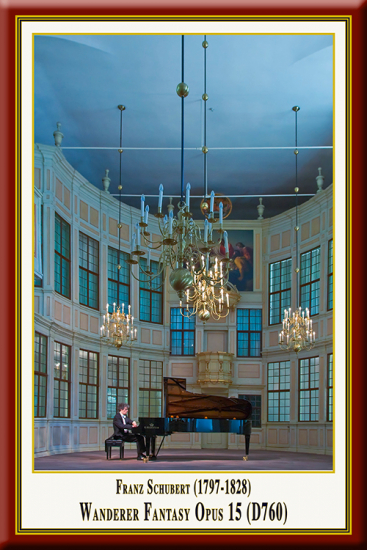SCHUBERT: Wanderer Fantasy Opus 15
Fantasia Opus 15 in C major (D 760)
"Wanderer Fantasy"
Art Movie by Josef-Stefan Kindler
after and with Franz Schubert's
Fantasia for Piano Opus 15
"Wanderer Fantasy",
performed live by Franz Vorraber
at Bad Homburg Castle (Germany)
on a C. Bechstein Concert Grand Piano D 280
1 Chapter · Runtime: c. 27 Minutes
T
he "Wanderer Fantasie", as it is known, was written almost five years earlier, between 1822 and 1823. The words of a line from the Schubertlied, "Der Wanderer", set the theme for the second movement, which, in turn, forms the central sequence of variations that make up the piece. This is a daring, orchestral-like work that is unique even in our times. It consists of four movements built around one rhythmic motif, with each movement flowing into the next without a break, thus turning the four into one whole entity. Although the title of "Wanderer Fantasie" was not Schubert's, the reference to the lied "Der Wanderer" is obvious because of the central theme of the piece. The dominant rhythm pattern also appears in other works by Schubert. Wandering ceaselessly, without ever stopping - this continuous flow ad infinitum pulls everything along with it. It is the wandering of our lives, the relentless flow of time - time, which, as a symbol in the arts, is perhaps best represented by music. This wandering may well be interrupted by dreams, as in the 2nd movement, but it remains an ungovernable force that cannot be escaped. At the end of the third movement, Schubert composed a tremendous crescendo of sound that was probably too much for the instruments of that time to cope with and which merges into a fugued fourth movement in octaves, where sound unfolds in all possible registers. The notes are distributed up and down the entire keyboard, and there are chord tremoli and octave runs galore, all of culminate in an untamed flood of sound in C major.
Franz Vorraber in November 2007
P
ublishing Authentic Classical Concerts entails for us capturing and recording outstanding performances and concerts for posterity. The performers, audience, opus and room enter into an intimate dialogue that in its form and expression, its atmosphere, is unique and unrepeatable. It is our aim, the philosophy of our house, to enable the listener to acutely experience every facet of this symbiosis, the intensity of the performance, so we record the concerts in direct 2-Track Stereo digital HD. The results are unparalleled interpretations of musical and literary works, simply - audiophile snapshots of permanent value. Flourishing culture, enthralling the audience and last but not least also you the listener, are the values we endeavor to document in our editions and series.
Music that is new, pieces worth listening to and well worth conserving, little treasures from the traditional and the avantgarde - music that is unimaginable anywhere else but in the hotbed of Europe - we capture these in our Castle Concerts Series of recordings in their original settings in cooperation with Volker Northoff.
The concert grand piano is incontestably the king of instruments. We could now wax lyrical about its incomparable dynamics and go into its ability to go from the tenderest of sounds in a soft minor key to the magnificent power of a fortissimo, or I could rhapsodise about its impressive size and elegance. But what makes this instrument really fascinating is its individuality, since each one is unique in itself - created by a master. A concert grand has a life all of its own that a virtuoso can really "get into" and hence bring the work of the composer to life. In our Grand Piano Masters Series, we get into the character and soul of the concert grand piano and experience, during the performance itself, the dialogue between the instrument, the virtuoso and the performance space.
Andreas Otto Grimminger & Josef-Stefan Kindler, K&K Verlagsanstalt




